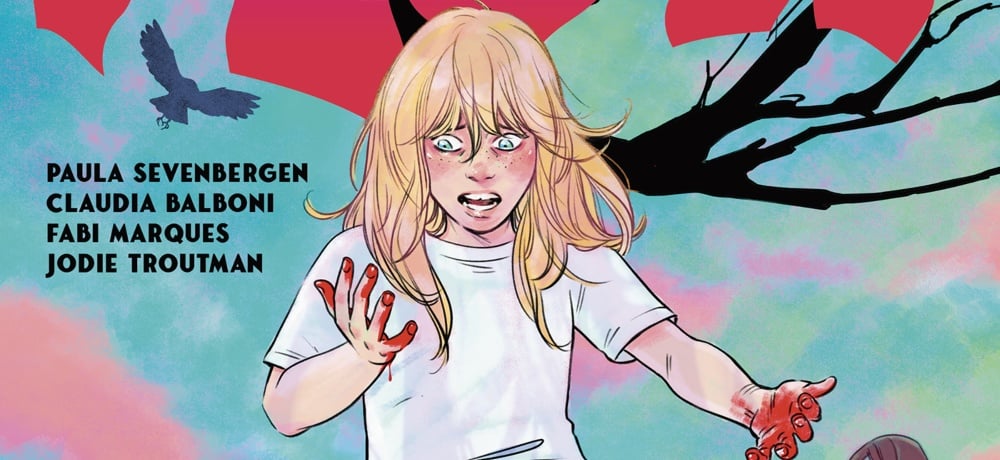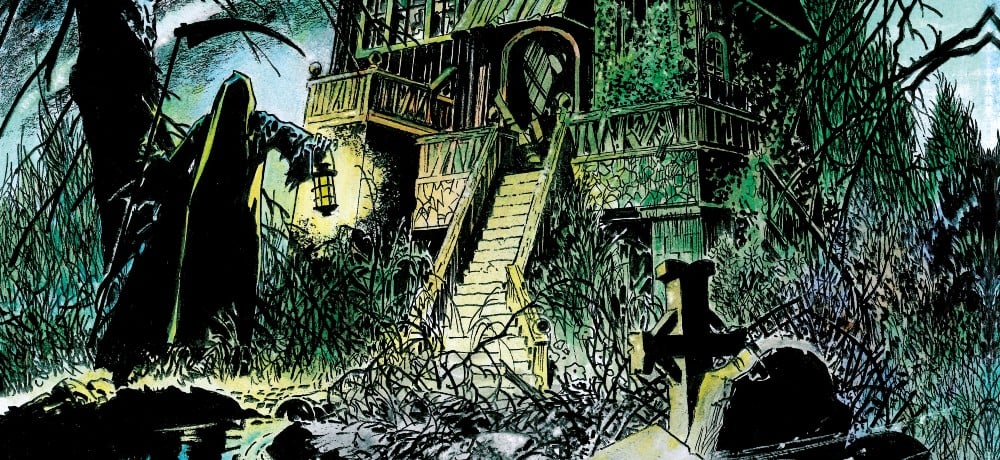





Fantastic Fest 2018 played host to an amazing array of films from all over the world, including Tumbbad, a timeless tale of greed and the demons we must face in our lives, both figuratively and literally. A truly haunting and ambitious film set in a remote village in India, Tumbbad impressed me with not only its confidence in world-building, but it also manages to explore some universal themes with its slight fairy tale bent that feels akin to the early films from Guillermo del Toro.
While in Austin, Daily Dead chatted with both co-writer/co-director Adesh Prasad and composer Jesper Kyd about their experiences working on Tumbbad, and they discussed story inspirations, putting together the film’s score, handling the challenges of making Tumbbad, and more.
Adesh, I'd like to start with you and talk about building this story and this world and some of the inspirations behind it.
Adesh Prasad: It has taken us six long years to make, which is obviously abnormally a long time to make a movie. And in this time, there have been so many, many inspirations. Of course in our country, we have a very strong culture of folklore and every region has its own mythology, where there are stories within stories within stories. So, the idea was born from those mythologies, and from our specific culture. But as an artist, you consume so much that doesn’t necessarily belong to your own region, and what happens is that there is always the stuff that you watch, and you admire those stories that leave a mark in your heart, that have their own funny way of finding their way into whatever you create. Sometimes it's not even conscious, and I think that has been the case with this film.
The inspirations come from everywhere. It's very difficult to say exactly where, because some of it is mythology, but some of it also comes from shows like Tales from the Crypt or Game of Thrones. I think it's reflected in our film in a very fun way because I find the film very schizophrenic, where it starts off as something, it becomes something else, and then it becomes something else, and it just keeps changing until the climax of the film. And I think the reason for that is because there have been so many influences poured into this.
I also think those shifts are very reflective of where the characters are at emotionally, too, throughout the movie. So it makes sense that the film itself goes through these different phases as these characters also go through these different phases.
Adesh Prasad: Absolutely. We never just followed one genre, either, so we had to work back and forth between all these genres in this film, too.
Jesper, you're here representing the sonic nature of this film, and it so beautifully pairs with the visuals. How was the collaborative process for you while you were working on making this music? Was it something you guys collaborated together on, or did you just get to run with it?
Jesper Kyd: Well, I definitely got to run with it. That's very much what Adesh encouraged. There was a lot of experimentation, but we were very closely communicating about everything this movie needed as far as the music. We had a lot of Skype meetings—it felt like we were on Skype every night for a long time. I would go on at midnight. I'd start a cup of coffee and we would talk a lot about just the movie and the current scenes I was working on, that kind of stuff. It wasn't really that much about music, which is a great way to work because that means that there's more room for experimentation than someone saying, “We know exactly what we want, that's what you need to do.” That's not how it was at all.
But I think from the beginning, it became very clear that this movie needed three different music styles for the three different periods that it's set in. And the first part being more musique concrète, where music is made with found objects. It needed that super-realism to go with how the movie portrays those moments. Then, the second part of it was a lot about mythology and creating a more epic sound in general. The third stage was the opposite, because we had a more personal sound in mind, so that audiences could connect with Vinayak, and his actions and how it affects his family, so we used a lot of solo instruments there.
How long did it take to come up with this idea, in terms of making it very three distinct parts, but finding a way to make it all work together seamlessly?
Jesper Kyd: Everything was very organic with this movie, and so the first edit that Adesh sent me, I basically wrote a few hours of themes for that. And about a year later, he sent me another edit, and this version was more like the final version, and so I started scoring the whole movie very specifically. It was about five or six hours of music altogether for a movie that's 108 minutes.
But it took a lot of searching and again, this was because when I was approached with this movie, it wasn't like we knew exactly what we wanted. It was like the complete opposite. We had to find out what the movie sounded like, and I think once you start putting music in a movie, it changes the movie so much that you have to be careful that you're not changing in a direction that people are not happy with. As soon as music goes into a movie, everything changes.
There's so much ambition on screen in this movie, between the production design, the cinematography, and the various effects work as well. For me, the worst thing a movie can do is just play it safe, and I don't think you guys do that here. Can you talk about embracing the challenges you faced while making Tumbbad?
Adesh Prasad: See, the thing is, as artists, you can do certain things, right? But to be able to realize what you want to do, artists need a playground, and the playground is always sponsored by the producer and the financiers. They are always the ones who draw this border around your playground. “You have to play inside this.” But in the case of Tumbbad, we were very, very fortunate to have a producer in Sohum Shah, who is also the lead actor of the film, who didn't draw any boundaries with us. He was constantly with us, supporting us with every ideation that we did of the script, with every new idea that we came up with. He was the first one to get excited, and he was someone that just trusts other people. He trusted our ambition.
But the moviemaking business is a very expensive business as well. As a director, and as a writer, you still want it to make some money at the end of the day, right? But I remember, there was one day during the edit where I was taking a big chance. It was a big risk, so I went to Sohum and I said that I wanted to do this, and I would understand if he wanted me to make a conventional choice instead. He just told me not to worry about it, and to do whatever it is that I wanted to do. He said, “If the film fails, it is my failure, but if the film works, it is your work.” That suddenly lifted so much of this pressure that you constantly have as a filmmaker, because you always want to make sure it was all worth it.
---------
Keep an eye on our Fantastic Fest 2018 hub to keep up to date on all of our live coverage from Austin!